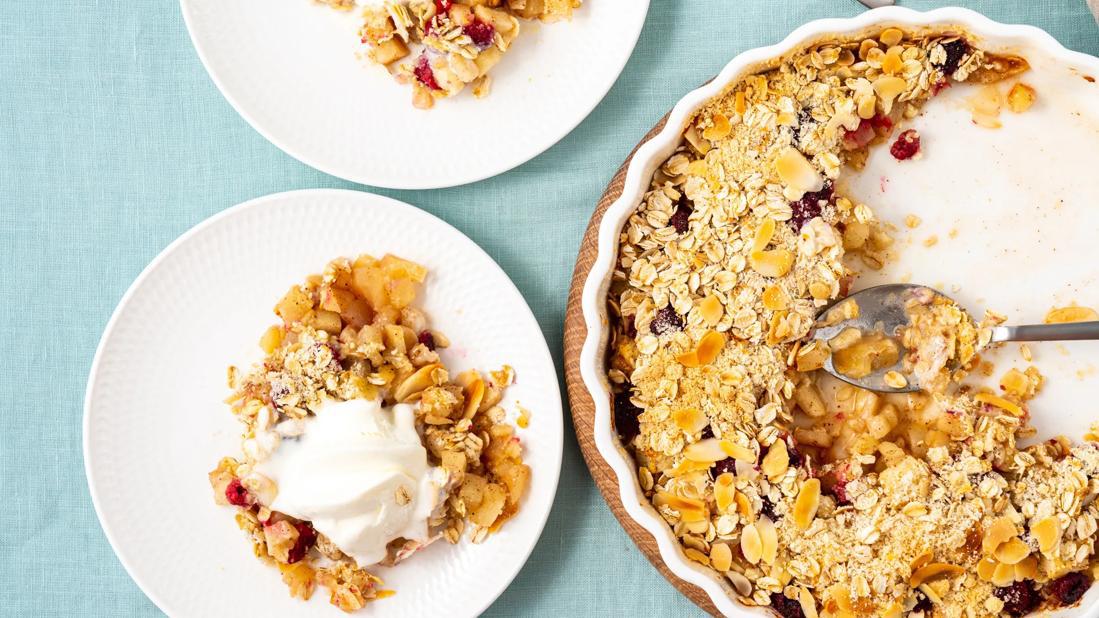Recipe: Winter Fruit Gratin
A warm dessert alternative to enjoy on a cold day

Dessert doesn’t always have to be cake, cookies or ice cream. Try this warm baked fruit dish as an alternative sweet end to a meal.
Ingredients
- Butter cooking spray (for vegan option, use a canola oil spray)
- 2 Bartlett pears, peeled and cut into bite-sized pieces (about 2 cups)
- 2 Gala apples, peeled and cut into bite-sized pieces (about 2 cups)
- 1 cup frozen cranberries
- 2 tablespoons brown sugar blend
- 3 tablespoons Grand Marnier or other orange liquor
Topping
- 1/3 cup rolled oats
- 1/4 cup sliced almonds
- 2 tablespoons brown sugar blend
- 2 tablespoons whole wheat flour
- 1/4 teaspoon ground cinnamon
- 2 tablespoons trans-fat-free margarine, cut into small pieces
Directions
- Preheat the oven to 400 F. Lightly coat an 8-inch casserole with cooking spray.
- Toss the pears, apples and frozen cranberries with the sugar blend and Grand Marnier in the prepared casserole.
- In a small bowl, combine the oats, almonds, sugar blend, flour and cinnamon. With your fingers, work in the margarine to make a crumbly topping.
- Sprinkle over the fruit and bake for 18 to 20 minutes, until the top is browned and the fruit is bubbling. Let cool for 5 minutes before serving in dessert bowls.
Ingredient health benefits
- Pears. A cold-weather delight, pears have anthocyanins, vitamin C, vitamin B6 and other antioxidants that lower inflammation and support your immunity. There’s also pectin, a soluble fiber and prebiotic, to promote healthy digestion and feed the “good” gut bacteria. And what’s more, your heart and blood cells can also use the potassium and vitamin K to keep the beat and ensure normal clotting when you’re injured.
- Apples. It’s relatively easy to find these fruits stocked in the produce aisle year-round. And good thing, too! Apples are loaded with antioxidants like quercetin and pectin that help decrease your cholesterol and boost the health of your gut’s microbiome. Their fiber helps keep you fuller for longer, while their high water content can tame your thirst. And just as important, apples tend to be accessible to most budgets!
- Cranberries. These bog berries are rich in antioxidants like anthocyanins and flavanols, which lend their anti-inflammatory (and potentially anti-cancer) benefits while providing that eye-catching, trademark red. Cranberries also have unique natural properties that may fight “bad” bacteria in your gut, promote oral health and help prevent urinary tract infections (UTIs).
- Almonds. Chopped or whole, almonds are an excellent source of vitamin E and flavonoids, antioxidants that promote healthy skin and fight free radicals. These well-known nuts also have lots of calcium, and they’re packed with unsaturated fats that help reduce your LDL (“bad”) cholesterol while raising your HDL (“good”) cholesterol. The minerals potassium, magnesium and phosphorus help regulate your blood pressure and fortify your teeth and bones.
- Whole grains. Ever wondered why this food group is considered essential? Whole grains are an excellent source of B vitamins, which help create new cells and regulate how your body turns food into energy. They have skin-supportive vitamin E, gut-helpful fiber and plant protein to keep your stomach sated. Eating whole grains regularly is also a good way to get some unsaturated fats, which help lower your cholesterol and, potentially, your risk of certain cancers like colon cancer. Oats may actually be the best whole grain for lowering cholesterol, and they have minerals like manganese, copper and magnesium to maintain your bones and blood cells.
Nutrition information (per serving)
Makes 4 servings
Calories: 240
Total fat: 6 g
Saturated fat: 1 g
Protein: 3 g
Carbohydrate: 39 g
Dietary fiber: 7 g
Cholesterol: 0 mg
Sodium: 55 mg
Potassium: 275 mg